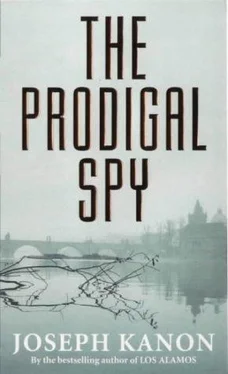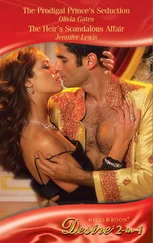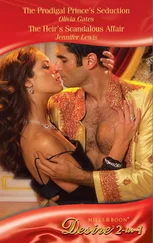It was in a cafe at the bottom of the square, off Narodni Street, and the minute he walked in he knew it was a mistake. The dark room, smoky, filled with shadows, was the part of him he’d been trying to push away. They couldn’t take a table without interrupting the show, so they stood at the bar in the dark, and Nick found himself scanning the room, looking at faces to see if any of them were looking back.
The mimes worked in front of a bright spot, forming shadows against a screen, like children making rabbit ears on the wall with their fingers held up to a lamp. The play between the actors and their own larger shadows caused a trick of the eye, a clever chiaroscuro, but all Nick saw were the shadows, dancing, then elusive, sliding toward the edge until you could no longer see where they ended and the real dark began. The customers, sitting at cabaret tables, gave off the same effect, sometimes visible in the light, then vanishing into the recesses. No wonder the Czechs liked Goodman, the bright lights and the simple, bouncy music. This was the native product, all shadows, a city practised at fading into doorways.
He went into the men’s room, grateful for the light. A man, cigarette dangling, stood at the urinal, so he went into the stall. What if there was someone in the stall tomorrow? What did he do, keep going back until it was empty? He pulled the chain, looking up at the flush box mounted on the wall. He’d imagined a toilet with a back, a convenient shelf. Where did you leave the ticket, on the paper dispenser? Why had his father changed his mind? The man at the urinal said something in Czech over the plywood wall, hearty, maybe a joke about the effects of beer on the bladder, but it could have been anything. What if someone spoke to him? Nick just nodded to him blandly when he came out, not even stopping to wash his hands, afraid of being caught out by language. He pushed open the door to a round of applause.
“Aren’t they wonderful?” Molly said brightly. “There’s one more set. Want to sit?”
“No. Do you really want to stay?”
“You don’t like mimes. Here, finish this.” She handed him a brandy. “Ten minutes, okay?”
He took a long pull on the drink to burn away his mood. When he looked up over the glass, a shadow had come out of the wall.
“We meet again,” Marty Bielak said. “You seem to be everywhere tonight.”
“That makes two of us.”
“Well, a nightcap.” He held up his glass. Where else had he been? The Alcron. The Cafe Slavia. The legman making his rounds. Items for tomorrow’s column. Just like the old days. The Stork. The Blue Angel. Another iron curtain joke. Cafe society was still alive here, lounge lizards and all.
“They’re terrific, aren’t they?” Bielak said, nodding toward the mime troupe. “I never get tired of them.”
“You’ve seen them a lot?”
“Well, there aren’t so many clubs here.” He took a drink, standing closer. “I see you met one of our local celebrities.” Prodding. “At the concert. He didn’t introduce himself?” Insistent now, close.
Nick wasn’t sure what to answer. How would it be reported? But Bielak was waiting, his lips wet with drink.
“Yes,” Nick said finally. “I thought he was in Moscow.”
Bielak nodded, his air confiding. “He married a Czech. A bourgeoise.” The term threw Nick, some bizarre leftover from the old party meetings, those hours of dialectic and self-discipline. But Bielak didn’t hear it as an anachronism, and when he saw Nick’s look, he said, “Of course, not now.”
“I didn’t know,” Nick said vaguely.
“What did he say? I’d be curious.” He had leaned even closer, his whole body a kind of insinuation.
“Not much. How I liked the concert,” Nick said. But this wasn’t going to be enough. “I think he was a little disappointed that I didn’t recognize him.”
“Too much?” But Bielak seemed pleased. “Yes. He used to be famous, you see.” He shook his head. “Nobody remembers, do they?” Delighted somehow, a press agent watching a falling star.
“We have to go,” Nick said, signaling to Molly.
“So soon? They’re not finished.”
“No, but I am. We have to be up early.”
Why had he said that? Bielak, however, was smiling, amused.
“Young people,” he said. “In my day, we could dance all night.” So he had watched. Was still watching. “One more drink?” Was it possible he just didn’t want to go home? The empty apartment.
“Thanks, some other time. Molly?”
Bielak nodded and raised his fingers from the glass in a kind of wave. “I’ll see you around,” he said, his voice pleasant, not sinister at all.
Back in the street, Nick was rattled. A chance meeting? What if he was around tomorrow? In the lobby. At the station itself. As they walked along the street he found himself looking to the side, expecting shadows to move. It’s simple, his father had said. But it wasn’t. A quarrel with Molly? Who would believe it? Not Bielak, making his rounds. Nobody just got on a train, not here. Why risk it, all of a sudden? He started picking the story apart, uneasy.
Later it was worse. When Molly fell asleep curled next to him, he stared at the street light on the ceiling, looking for microphones that might not be there. You always brought me luck. Something was wrong. And what would Vienna be like? More cat and mouse. He wanted to turn his mind off, sleep, but instead he lay still with dread, awake with night fears, the ones that didn’t even have names.
He shaved without running the water, careful not to wake her, and dressed quietly in the dim light. He put a few things in the small canvas bag, then crossed over to the desk and took her passport out of her purse. Both of them were leaving, a better story. No quarrel. She’d be late. When the floorboards creaked he stopped, but she didn’t move, a mound under the covers. He turned the knob slowly, so that when he finally closed the door behind him there was only a soft click. In the hall a maid stared at him as if she’d caught him coming out of someone else’s room, but he nodded and whispered ‘ Dobre rano’ when he passed, just an early bird. He went down the stairs. The lobby was empty, but just in case he paused and took out his street map, a tourist plotting his walk, his head still down as he passed through the revolving door.
It was early, just a few people on their way to work, but he turned off Wenceslas at the first corner and took a series of side streets to circle back to the bottom of the square. Nobody was following. Near the Powder Tower he caught a tram, and watched out the window as it traveled back across Wenceslas, past the hotel, the doorman yawning. He walked to the university and headed left toward the station. The back streets, oddly, seemed less safe, without a crowd to hide in, but he kept going, one more deliberate wrong turn, then a glance at the map, another street, and he was there, the creamy art nouveau facade, vaulting shed behind, Wilsonova Street half filled now with sleepy commuters. Policemen stood near the doorways, looking bored, guns at their sides. No one looked at him.
The woman at the ticket booth said something in Czech and repeated it until Nick tried his little bit of German: ‘ Zwei nach Wien.“ She took the passports and examined them, checking against sheets in a looseleaf binder, then leaned forward to look to his side, evidently expecting to see Molly. When she spoke Czech again, he gestured with his hands to indicate that she was following. The woman said something again, then, seeing his blank expression, gave it up, shrugging and stamping the tickets. Life was too short, even here. She took the money, grumbling at having to make change. ” Pet.“ He stared and she repeated it, then grudgingly took a slip of paper and wrote ’5‘, pointing toward the platforms. He nodded, thanking her in German, and moved away, putting the tickets in his pocket. That was it, as easy as he had said.
Читать дальше












